Internal mini form
Contact Us Today
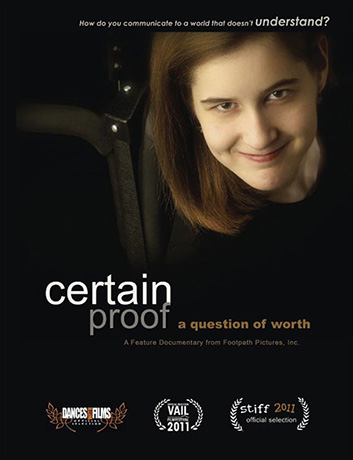
For children with Cerebral Palsy, receiving a meaningful education in the public school system often depends upon having to prove to educators they are capable of learning.
Director: Ray Ellis
Filmed by: Susan Ellis, Ray Ellis
Production of: Footpath Pictures
Original Music by: Rod Abernethy
Starring: Josh Werner, Colin Schneider, Kay McMillan, Dawn Werner, Debra Schneider, Sandy McMillan, and Karen Erickson
Rating: Not Rated
Genre: Documentary, Biography
Length: 59 minutes, 6 seconds
Released: March 2011 (USA)
‘Certain Proof’ follows children through byzantine education system
Imagine, as a young child, having to prove to your teachers that you are worthwhile enough to be taught.
School is supposed to be a place that opens up the world to young people. That’s a given for most students, but for students with disabilities, often times the impression that they are incapable of learning forces a situation other students don’t encounter: They must prove to educators that they deserve to be educated at grade level, with their able-bodied peers.
“Certain Proof: A Question of Worth” is a 60-minute documentary that tackles the topic in-depth by following the efforts of three children, Kayla, 12, Josh, 6, and Colin, 9, who are living with Cerebral Palsy. Despite multiple disabilities, they and their parents fight to prove that they are able to handle the rigors of a mainstream class.
The film is produced by Footpath Pictures, directed by Ray Ellis and filmed by Ray and his wife, Susan, to expose overlooked social issues. The inspiration for the film occurred when the couple was introduced to a local non-profit dedicated to educating children with mobility and communication disabilities. The footage for “Certain Proof” was shot in 2007, with additional footage being added in 2009. The film premiered March 2011 at the Vail Film Festival, Colorado.
The film asks a simple question most children typically are not asked to answer: How can a child provide proof of their worth in order to receive a public education? (And, why should they?)
The film begins with and introduction by the Oscar-nominated actor Chris Cooper, whose son, Jesse, had Cerebral Palsy, and died in 2005 at the age of 17. Viewers are introduced, one by one, to each child and their mothers, all of whom are dealing with issues at their child’s school.
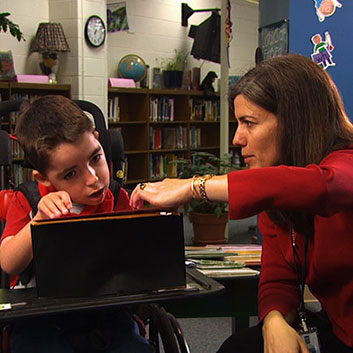
Photo Credit: Ray Ellis
Josh Werner is 6 years old and was diagnosed with Cerebral Palsy at four months old; Colin Schneider is 9 years old and suffered a hypoxic injury to his brain in the birth process; and Kayla McMillan is 12 years old and was diagnosed at three months old.
Kayla’s mother, Sandy McMillan, talked about the initial shock she experienced when Kayla received her diagnosis.
“I think the biggest fear is the unknown, when you have children you have expectations and dreams for them, she said. “And then when you have a child with Cerebral Palsy, it’s like someone pulled the rug out from under you because you don’t know what to expect and in a lot of ways a lot of people look to you for answers, and you really don’t have them.”
But once a child turns four or five years old, parents are left to make decisions about a child’s education. And sometimes, there’s broad disagreement among parents and educators about how to educate a child with disabilities.
Josh
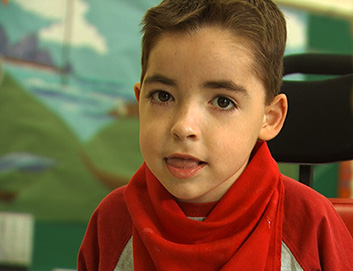
Photo Credit: Ray Ellis
Josh is confined to a wheelchair and is nonverbal. He has limited use of his hands. He uses non-verbal cues to communicate with others. Josh’s public school is unclear about Josh’s capability.
Dawn Werner, Josh’s mother, said educators at Josh’s school don’t believe in Josh’s potential because he is nonverbal and has limited use of his arms and hands.
“It’s hard when people around us don’t think he’s in there,” she said. “The world assumes he can’t learn. That’s the danger. Why not first assume that he understands everything? That’s the least we can do.
“He’s at the mercy of everyone around him sometimes,” she added. I think Josh knows what’s going on, but it’s hard to get everyone else see it. I can see in people’s face that they think I’m wasting my time. It wears on you after a while.”
Colin
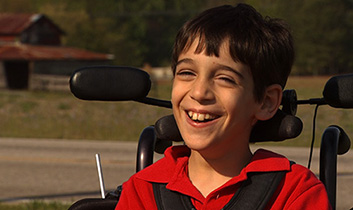
Photo Credit: Ray Ellis
Colin, on the other hand, has no problems expressing his ideas. He expresses several interests – including girls – and he’s mastered the use of his computerized device. Yet his mother, Deby Schneider, is facing the same challenge as Josh’s mother at her son’s school. He is in the third grade, but his teachers believe he is working at about a first grade level. However, Deby believes Colin knows more than the teachers can determine, and that they’re assuming Colin doesn’t understand what’s happening around him because he is nonverbal.
The school feel it’s best able to meet Colin’s needs in a contained classroom for disabled students because there are fewer students; he would receive more attention from his teacher. But Deby believes that he is not getting an opportunity to thrive in a conventional education setting and wants more inclusion for her son.
“Colin is a smart kid,” she said. “But when they pull him away from his third grade friends, they’re telling him (that) he’s not good enough to keep up, that he’s not good enough to be there. The truth is that they don’t know how to include him in the class.”
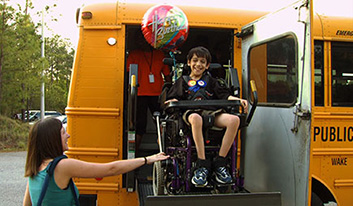
Photo Credit: Ray Ellis
Colin uses a wheelchair and a headpiece with a pointer to communicate. His paraprofessional at school said he is observant, curious and intelligent.
Kayla
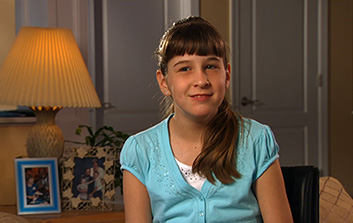
Photo Credit: Ray Ellis
As a sixth-grader and first-time middle school student, Kayla senses that her teachers are ambivalent about working with her. “Whenever I start a new school they look like a bomb hit them,” she said about the shift to middle school. “It was nerve-wracking. They never had someone like me.”
As the film progresses, Kayla continues to prove she can be successful in a mainstream classroom setting. Her mother Sandy said that when her daughter was in kindergarten, she could say only “yes” or “no,” but by the time she is 12 years old, she has an extensive vocabulary. By the time the film fast forwards to Kayla’s entry into high school, she is working on complex geometry problems, but struggling with the pace of homework.
The film also addresses some of Kayla’s social challenges. “I guess they think I am stupid. They talk like I’m not there,” Kayla said. “I’m like, ‘Hello, I’m right here.’ I feel like I have to prove myself. Then, people see.”
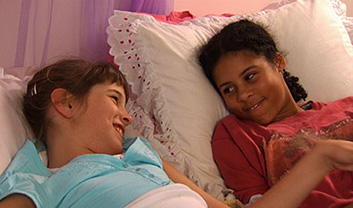
Photo Credit: Ray Ellis
One student, when a list of straight-A students was posted at school, expressed astonishment that Kayla’s name was on the list.
The film also shows Kayla’s friend and physical education partner, Jessica. “Jessica sees behind my disability,” Kayla said.
A Question of Worth
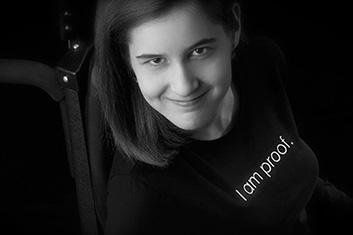
Photo Credit: John Fernez
The film also follows an independent assessment of Josh’s capabilities, which brings a sense of hope to his mother. Interviews with experts and educators are included in the film, to present all sides of a multi-faceted issue where there is little agreement and few solutions that will satisfy all stakeholders.
At the heart of “Certain Proof” are complex questions: Is the education system forcing parents to scale back their expectations and dreams for their children? Are educators, parents, governments and citizens willing to demand a system that ensures every child – no matter his or her situation – can live up to their potential?
“A lot of times we underestimate the amount of time that it takes to help somebody find their voice,” said Joshua Alexander, MD, who works with Josh at the University of North Carolina Medical Center.
“The true test of our society now [is that] we have science to save children’s lives,” he said. “The question is, do we have the humanity and resources that are going to make those lives meaningful.”
To Learn More About ‘Certain Proof: A Question of Worth’
To visit “Certain Proof” website
To purchase “Certain Proof”
To follow “Certain Proof” on Facebook
To follow “Certain Proof” on Twitter
To visit “Certain Proof” on YouTube

Of course parents already know their child’s journey is the stuff movies are made of, but as it turns out, there are several movies about individuals with Cerebral Palsy and how their condition has affected their lives. Here are some films that tell stories about inspiring people.





